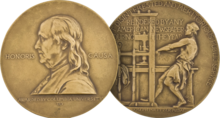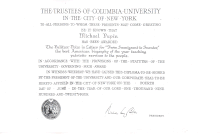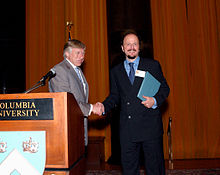
A | B | C | D | E | F | G | H | CH | I | J | K | L | M | N | O | P | Q | R | S | T | U | V | W | X | Y | Z | 0 | 1 | 2 | 3 | 4 | 5 | 6 | 7 | 8 | 9
| Pulitzer Prize | |
|---|---|
| Current: 2023 Pulitzer Prize | |
 Obverse and reverse sides of the Pulitzer Prize for Public Service gold medal, designed by Daniel Chester French in 1917 | |
| Awarded for | Excellence in newspaper journalism, literary achievements, musical composition |
| Country | United States |
| Presented by | Columbia University |
| First awarded | 1917 |
| Website | pulitzer |
The Pulitzer Prize (/ˈpʊlɪtsər/[1]) is an award administered by Columbia University for achievements in newspaper, magazine, online journalism, literature, and musical composition in the United States. It was established in 1917 by provisions in the will of Joseph Pulitzer, who had made his fortune as a newspaper publisher.[2]
As of 2023, prizes are awarded annually in 23 categories.[3] In 22 of the categories, each winner receives a certificate and a US$15,000 cash award, raised from $10,000 in 2017.[4] The winner in the public service category is awarded a gold medal.[5][6]
History

Newspaper publisher Joseph Pulitzer gave money in his will to Columbia University to launch a journalism school and establish the Pulitzer Prize. It allocated $250,000 to the prize and scholarships.[7] He specified "four awards in journalism, four in letters and drama, one in education, and four traveling scholarships."[2]
After his death on October 29, 1911, the first Pulitzer Prizes were awarded June 4, 1917; they are now announced in May. The Chicago Tribune under the control of Colonel Robert R. McCormick felt that the Pulitzer Prize was nothing more than a 'mutual admiration society' and not to be taken seriously; the paper refused to compete for the prize during McCormick's tenure up until 1961.[8][9]
Entry and prize consideration

The Pulitzer Prize does not automatically consider all applicable works in the media, but only those that have specifically been entered. Each entry must be accompanied by a $75 handling fee. Entries must fit in at least one of the specific prize categories, and cannot simply gain entrance for being literary or musical. Works can also be entered only in a maximum of two categories, regardless of their properties.[10] Only United States citizens are eligible to enter the Books, Drama, and Music categories, with the exception of the History category, which has no nationality restrictions but is restricted to books that cover United States history. Entrants to the Journalism categories are not restricted by nationality, provided their submitted work appeared in a United States publication.[11]
Each year, more than 100 jurors are selected by the Pulitzer Prize Board to serve on 22 separate juries for the 23 award categories; one jury makes recommendations for both photography awards. Most juries consist of five members, except for those for Public Service, Investigative Reporting, Explanatory Reporting, Feature Writing, Commentary and Audio Reporting categories, which have seven members; however, all book juries have five members.[2] For each award category, a jury makes three nominations. The board selects the winner by majority vote from the nominations, or bypasses the nominations and selects a different entry following a 75 percent majority vote. The board can also vote to issue no award. The board and journalism jurors are not paid for their work; however, the jurors in letters, music, and drama receive honoraria for the year.[2]
Difference between entrants and nominated finalists
Anyone whose work has been submitted is called an entrant. The jury selects a group of nominated finalists and announces them, together with the winner for each category. However, some journalists and authors who were only submitted, but not nominated as finalists, still claim to be Pulitzer nominees in promotional material.
The Pulitzer board has cautioned entrants against claiming to be nominees. The Pulitzer Prize website's Frequently Asked Questions section describes their policy as follows: "Nominated Finalists are selected by the Nominating Juries for each category as finalists in the competition. The Pulitzer Prize Board generally selects the Pulitzer Prize Winners from the three nominated finalists in each category. The names of nominated finalists have been announced only since 1980. Work that has been submitted for Prize consideration but not chosen as either a nominated finalist or a winner is termed an entry or submission. No information on entrants is provided. Since 1980, when we began to announce nominated finalists, we have used the term 'nominee' for entrants who became finalists. We discourage someone saying he or she was 'nominated' for a Pulitzer simply because an entry was sent to us."[11]
Bill Dedman of NBC News, the recipient of the 1989 investigative reporting prize, pointed out in 2012 that financial journalist Betty Liu was described as "Pulitzer Prize–Nominated" in her Bloomberg Television advertising and the jacket of her book, while National Review writer Jonah Goldberg made similar claims of "Pulitzer nomination" to promote his books. Dedman wrote, "To call that submission a Pulitzer 'nomination' is like saying that Adam Sandler is an Oscar nominee if Columbia Pictures enters That's My Boy in the Academy Awards. Many readers realize that the Oscars don't work that way—the studios don't pick the nominees. It's just a way of slipping 'Academy Awards' into a bio. The Pulitzers also don't work that way, but fewer people know that."[12]
Nominally, the Pulitzer Prize for Public Service is awarded only to news organizations, not individuals. In rare instances, contributors to the entry are singled out in the citation in a manner analogous to individual winners.[13][14] Journalism awards may be awarded to individuals or newspapers or newspaper staffs; infrequently, staff Prize citations also distinguish the work of prominent contributors.[15]
Recipients
Categories
| Pulitzer Prize | |||||||||||
|---|---|---|---|---|---|---|---|---|---|---|---|
 | |||||||||||
| Journalism | |||||||||||
|
|||||||||||
| |||||||||||
|
|
|||||||||||
Awards are made in categories relating to journalism, arts, letters and fiction. Reports and photographs by United States–based newspapers, magazines and news organizations (including news websites) that " regularly"[16] are eligible for the journalism prize. Beginning in 2007, "an assortment of online elements will be permitted in all journalism categories except for the competition's two photography categories, which will continue to restrict entries to still images."[17] In December 2008, it was announced that for the first time content published in online-only news sources would be considered.[18]
Although certain winners with magazine affiliations (most notably Moneta Sleet Jr.) were allowed to enter the competition due to eligible partnerships or concurrent publication of their work in newspapers, the Pulitzer Prize Advisory Board and the Pulitzer Prize Board historically resisted the admission of magazines into the competition, resulting in the formation of the National Magazine Awards at the Columbia Journalism School in 1966.
In 2015, magazines were allowed to enter for the first time in two categories (Investigative Reporting and Feature Writing). By 2016, this provision had expanded to three additional categories (International Reporting, Criticism and Editorial Cartooning).[19] That year, Kathryn Schulz (Feature Writing) and Emily Nussbaum (Criticism) of The New Yorker became the first magazine affiliates to receive the prize under the expanded eligibility criterion.[20]
In October 2016, magazine eligibility was extended to all journalism categories.[21] Hitherto confined to the local reporting of breaking news, the Breaking News Reporting category was expanded to encompass all domestic breaking news events in 2017.[22]
Definitions of Pulitzer Prize categories as presented in the December 2017 Plan of Award:[23]
- Public Service – for a distinguished example of meritorious public service by a newspaper, magazine or news site through the use of its journalistic resources, including the use of stories, editorials, cartoons, photographs, graphics, videos, databases, multimedia or interactive presentations or other visual material. Often thought of as the grand prize, and mentioned first in listings of the journalism prizes, the Public Service award is only given to the winning news organization. Alone among the Pulitzer Prizes, it is awarded in the form of a gold medal.
- Breaking News Reporting – for a distinguished example of local, state or national reporting of breaking news that, as quickly as possible, captures events accurately as they occur, and, as time passes, illuminates, provides context and expands upon the initial coverage.
- Investigative Reporting – for a distinguished example of investigative reporting, using any available journalistic tool.
- Explanatory Reporting – for a distinguished example of explanatory reporting that illuminates a significant and complex subject, demonstrating mastery of the subject, lucid writing and clear presentation, using any available journalistic tool.
- Local Reporting – for a distinguished example of reporting on significant issues of local concern, demonstrating originality and community expertise, using any available journalistic tool.[17]
- National Reporting – for a distinguished example of reporting on national affairs, using any available journalistic tool.
- International Reporting – for a distinguished example of reporting on international affairs, using any available journalistic tool.
- Feature Writing – for distinguished feature writing giving prime consideration to quality of writing, originality and concision, using any available journalistic tool.
- Commentary – for distinguished commentary, using any available journalistic tool.
- Criticism – for distinguished criticism, using any available journalistic tool.
- Editorial Writing – for distinguished editorial writing, the test of excellence being clearness of style, moral purpose, sound reasoning, and power to influence public opinion in what the writer conceives to be the right direction, using any available journalistic tool.
- Editorial Cartooning – for a distinguished cartoon or portfolio of cartoons, characterized by originality, editorial effectiveness, quality of drawing and pictorial effect, published as a still drawing, animation or both.
- Breaking News Photography, previously called Spot News Photography – for a distinguished example of breaking news photography in black and white or color, which may consist of a photograph or photographs.
- Feature Photography – for a distinguished example of feature photography in black and white or color, which may consist of a photograph or photographs.
There are seven categories in letters and drama:
- Biography – for a distinguished biography, autobiography or memoir by an American author.
- Drama – for a distinguished play by an American playwright, preferably original in its source and dealing with American life.
- Fiction – for distinguished fiction by an American author, preferably dealing with American life.
- General Nonfiction – for a distinguished and appropriately documented book of non-fiction by an American author that is not eligible for consideration in any other category.
- History – for a distinguished and appropriately documented book on the history of the United States.
- Memoir or Autobiography – for a distinguished and factual memoir or autobiography by an American author.
- Poetry – for a distinguished volume of original verse by an American poet.
In 2020, the Audio Reporting category was added. The first prize in this category was awarded to "The Out Crowd", an episode of the public radio program This American Life. In the second year, the Pulitzer was awarded for the NPR podcast No Compromise.[24]
There is one prize given for music:
- Pulitzer Prize for Music – for distinguished musical composition by an American that has had its first performance or recording in the United States during the year.
There have been dozens of Special Citations and Awards: more than ten each in Arts, Journalism, and Letters, and five for Pulitzer Prize service, most recently to Joseph Pulitzer, Jr. in 1987.
In addition to the prizes, Pulitzer Travelling Fellowships are awarded to four outstanding students of the Graduate School of Journalism as selected by the faculty.
Changes to categories
Over the years, awards have been discontinued either because the field of the award has been expanded to encompass other areas; the award has been renamed because the common terminology changed; or the award has become obsolete, such as the prizes for telegraphic reporting.
An example of a writing field that has been expanded was the former Pulitzer Prize for the Novel (awarded 1918–1947), which has been changed to the Pulitzer Prize for Fiction, which also includes short stories, novellas, novelettes, and poetry, as well as novels.
Chronology of Pulitzer Prize categories
